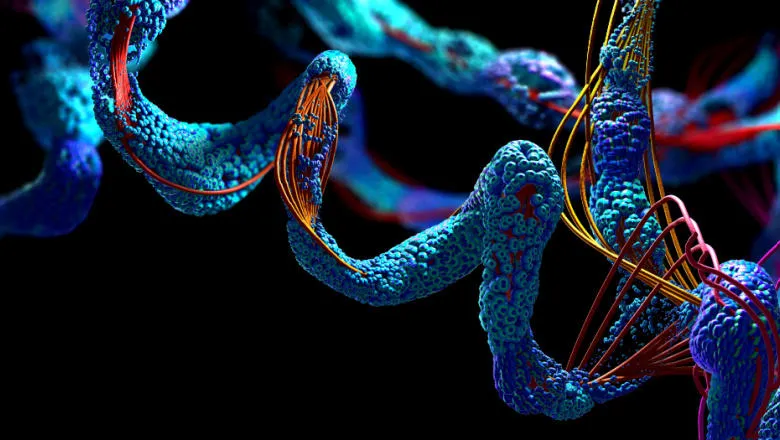Introducing mechanical bonds to cyclic peptide drug molecules will improve our ability to test and design new drugs. Mechanical bonds will enable tune cell permeability (a major issue with current cyclic peptide drugs) by finely adjusting the solubility and membrane permeability of cyclic peptide drugs, without affecting their structure, or activity once uncaged from their mechanical protecting group. This means we can control how we deliver drugs in the body, deactivating them until they’re in the right location to fulfil their function, which will reduce potential for toxicity and improve their stability.”
Dr Charlie McTernan, Physical Sciences Group Leader at the Francis Crick Institute and Lecturer in Department of Chemistry
11 April 2023
King's Chemist to further drug discovery efforts by researching use of cyclic peptides to build new molecular machinery
It’s hoped that the new research could lead to the development of novel drug delivery systems and cancer treatments.

King’s College London has been awarded a Project Research Grant from the Leverhulme Trust for Dr Charlie McTernan, Lecturer in Chemistry at King's and Physical Sciences Group Leader at the Francis Crick Institute, to investigate how cyclic peptides – amino acids and the building blocks of life – can be used to build the rings of rotaxanes – a form of mechanically interlocked molecule. The research has important implications for drug discovery and will construct a new language for molecular machinery.
Most chemists think about using covalent bonds – shared pairs of electrons – to make new molecules. Supramolecular chemists, like the McTernan group, look at weaker, more dynamic, interactions, such as mechanical bonds. Mechanical bonds form from the way two molecules are linked together – like when you tie a loop of thread through the eye of a needle, the needle and thread will now not fall apart, but cannot be separated. Mechanically interlocked molecules are the molecular scale analogy of this – consisting of rings of covalent bonds that cannot be separated without cutting open a ring.
These dynamic bonds hold the potential to miniaturise building to the nanoscale. By providing an avenue to change the relative positions of molecules in a reliable and repeatable way, mechanical bonds may hold the key to a ‘molecular industrial revolution’. Past achievements of building in the field include molecular motors, synthesisers and nanocars.
However, the current generation of mechanically interlocked molecules are made from hydrocarbon derived molecules, and formed in hydrocarbon derived solvents. This means they are often not stable, or able to dissolve, in water. Therefore, while the technology holds much promise in applying engineering principles at a molecular level, its current applications in biology, medicine and environmental remediation remain limited.
Dr McTernan hopes to change this by using cyclic peptides, which can be used in biological contexts to build new types of interlocked molecules. In doing so he believes these new structures, which are soluble in water, can be used to aid the development of new drugs and drug delivery systems.
This project will also explore how interlocked cyclic peptides can selectively target certain cell types, such as cancerous cells, thereby opening the possibility of developing novel approaches to cancer treatment.
This project is at the cutting edge of several rapidly emerging areas of science, including Chemical Biology, Cell Biology, and Membrane Science. It will act as a first step to bridge the current divide between biological molecular machines, which function in aqueous therefore biological environments, and artificial molecular machines, which function almost exclusively in organic solvents, by using water-compatible components, constructing a new language for molecular machinery.
Reflecting on the grant, Dr McTernan said: "Having introduced supramolecular chemistry to the Crick Institute for the first time, and building on strengths at King’s College London, I’m delighted that my group will be able to pursue a project which I hope will unlock a new generation of molecular machines, using molecular bonds in biological settings. I’m looking forward to using my experience of molecular machinery and self-assembly alongside the world leading expertise of colleagues at the Crick.”

